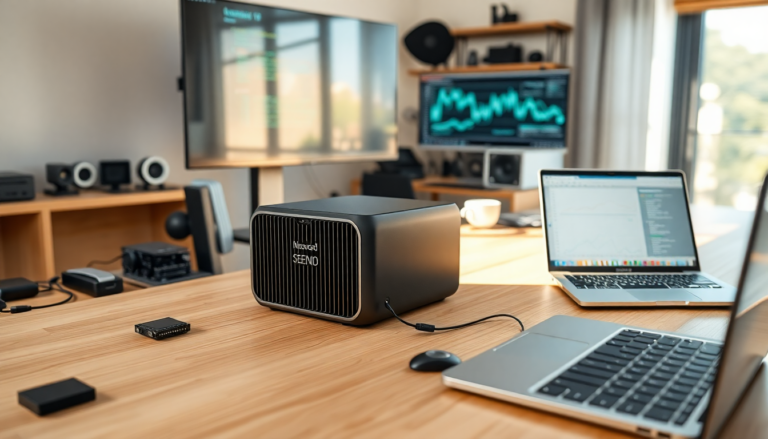Argomenti trattati
The world of computing is on the brink of a significant transformation, particularly in the realm of artificial intelligence (AI). As companies continue to innovate, we’re witnessing the emergence of powerful yet compact solutions that promise to redefine how we approach AI workloads. At the heart of this evolution is Nvidia’s GB10 platform, which seamlessly blends advanced technologies with remarkable performance capabilities. Asus’ upcoming Ascend GX10 mini-PC, set to launch on July 22, aims to leverage this platform to meet the growing demands of AI developers and enthusiasts alike.
Market Overview: The Rise of AI Computing Solutions
Have you noticed how the demand for AI-driven solutions has skyrocketed in recent years? This surge has led to a rapid expansion of the market for compact computing systems. Nvidia’s GB10 platform stands out as a true game-changer, promising to deliver data center-level performance in a small form factor. This isn’t just a passing trend; it reflects a broader industry movement toward integrating AI capabilities into our daily computing tasks.
At the core of this innovation is Nvidia’s GB10 Superchip, which combines a Grace CPU with a Blackwell GPU. This cutting-edge architecture features ten high-performance Arm Cortex-X925 cores and ten energy-efficient Cortex-A725 cores, offering unparalleled processing power tailored specifically for AI applications. Can you imagine systems achieving a staggering 1 PetaFLOPS of FP4 compute throughput? This makes it an enticing option for those diving into AI development.
But it’s not just about raw power; the platform’s memory architecture is equally impressive. With a unified memory system that supports 128GB of LPDDR5X memory, we’re looking at impressive bandwidths that rival the leading processors on the market. The ability to efficiently handle extensive datasets positions the GB10 as a formidable contender in the AI space.
Analyzing the Ascend GX10: Features and Capabilities
So, what can we expect from the Asus Ascend GX10 mini-PC? It’s poised to make a significant impact in the AI computing landscape, showcasing the capabilities of the Nvidia GB10 platform. Promotional materials suggest that this mini-PC will transcend traditional functionality, positioning it as a robust workstation designed specifically for edge AI applications.
What really sets the Ascend GX10 apart is its focus on performance and flexibility. This system is designed to accommodate a range of use cases, from developing large language models (LLMs) to running generative AI applications. In today’s fast-paced world, this versatility is critical as industries increasingly rely on AI for complex problem-solving and data analysis.
However, there’s a caveat. Despite the excitement surrounding the Ascend GX10, details about its pricing and availability are still murky. This ambiguity raises questions about its accessibility for potential users, especially when you consider other systems in the market, like Nvidia’s DGX Spark. With heavyweights like Dell, HP, and Lenovo gearing up to launch their own AI-driven mini-PCs, the competitive landscape is likely to shape consumer choices significantly.
Market Trends and Future Predictions
As we look ahead, the trajectory of AI computing is evolving at breakneck speed. With the unveiling of the GB10 platform and the Ascend GX10, we can anticipate a wave of AI-centric applications and systems. The emphasis on compact solutions that don’t compromise on performance aligns perfectly with the growing demand for efficient computing across various sectors.
Of course, price points for these advanced systems may present challenges for widespread adoption. However, as the technology matures and production scales up, we expect to see more competitive pricing structures emerge. This shift could pave the way for increased accessibility, allowing a broader audience to harness the power of AI.
Moreover, as companies increasingly integrate AI into their operations, the demand for training and development environments will rise. The Ascend GX10 and similar systems could play a pivotal role in this evolution, providing developers with the essential tools needed to innovate and thrive in an AI-driven future.

